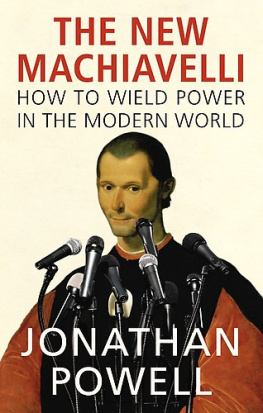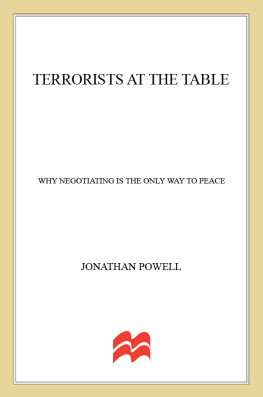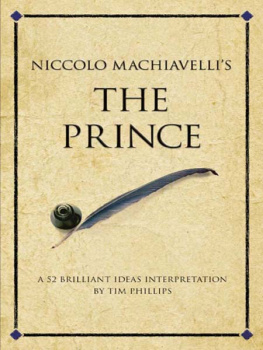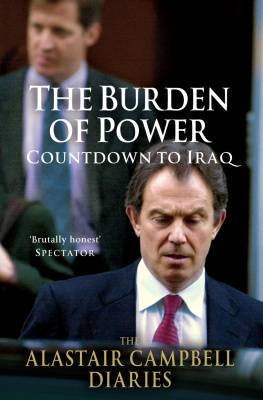ALSO BY JONATHAN POWELL Great Hatred, Little Room: Making Peace in Northern Ireland
This eBook is copyright material and must not be copied, reproduced, transferred, distributed, leased, licensed or publicly performed or used in any way except as specifically permitted in writing by the publishers, as allowed under the terms and conditions under which it was purchased or as strictly permitted by applicable copyright law. Any unauthorised distribution or use of this text may be a direct infringement of the authors and publishers rights and those responsible may be liable in law accordingly.
Epub ISBN: 9781407092522
Version 1.0
www.randomhouse.co.uk
THE BODLEY HEAD
LONDON
Published by The Bodley Head 2010
2 4 6 8 10 9 7 5 3 1
Copyright Jonathan Powell 2010
Jonathan Powell has asserted his right under the Copyright, Designs
and Patents Act 1988 to be identified as the author of this work
This book is sold subject to the condition that it shall not,
by way of trade or otherwise, be lent, resold, hired out,
or otherwise circulated without the publishers prior
consent in any form of binding or cover other than that
in which it is published and without a similar condition,
including this condition, being imposed
on the subsequent purchaser.
First published in Great Britain in 2010 by
The Bodley Head
Random House, 20 Vauxhall Bridge Road,
London SW1V 2SA
www.bodleyhead.co.uk
www.rbooks.co.uk
Addresses for companies within The Random House Group Limited can be found at: www.randomhouse.co.uk/offices.htm
The Random House Group Limited Reg. No. 954009
A CIP catalogue record for this book is available from the British Library
ISBN 9781847921222
The Random House Group Limited supports the Forest Stewardship Council (FSC), the leading international forest certification organisation. All our titles that are printed on Greenpeace approved FSC certified paper carry the FSC logo. Our paper procurement policy can be found at www.rbooks.co.uk/environment
Typeset in Walbaum MT by Palimpsest Book Production Limited,
Falkirk, Stirlingshire
Printed and bound in Great Britain by
Clays Ltd, St Ives PLC
To Sarah Contents Preface
Let me first be clear what this book is not. It is not another memoir of the Blair years; there are enough of those already. It is not an academic treatise on Machiavelli; there arent enough of those but I am not the person to write one. And it is not a considered history of the Blair era; sufficient time has not yet passed for such a work to be written.
Instead it is designed to be three things. Firstly, it is an attempt to test whether Machiavellis maxims still hold in the world of modern politics as well as they did when they were written. Secondly, it tries to draw some lessons on leadership and the exercise of power for future practitioners, based on my experience in Number 10. And lastly, it illustrates a series of generalisations by means of anecdotes from my time in government with Tony Blair and my knowledge of other British governments and US administrations, in the same way that Machiavelli illustrated his works with personal anecdotes from his time in the Florentine government. These anecdotes form the raw material for the use of future historians, not an attempt at writing history itself.
I am conscious that it is foolhardy to compare myself to Machiavelli. He was a genius and I am not. His works have lasted centuries and mine will not. It is also rash to try to rehabilitate the thinking of Machiavelli given how deeply rooted his caricature is in our culture. The fact that I am writing about him will be held by opponents to prove that the Blair government was unprincipled all along and it will certainly lead to my being described as Machiavellian, which will raise a smile on the lips of my former colleagues at Number 10. If anything I was at the Candide end of the spectrum rather than calculating, and like Voltaires hero I was an innocent unable to stop asking gauche questions and blurting out the truth, however inconvenient. But I am not too worried by any such criticisms because they will just illustrate the ignorance of those who make them about Machiavelli himself, about his thinking and about the way in which the Blair government really operated. And it is worth risking the opprobrium because I hate to see myths remain unchallenged when British politics desperately needs a dose of realism and honesty.
I would worry, however, if anyone read this book and thought politics was just about cynical manoeuvring and manipulation. It is not. After thirty years in government I am, if anything, more optimistic than I was when I started about the ability of government to change things. Politics is above all about idealism, values and ideas. This book is of limited scope, though, and does not address those important aspects. It is confined to looking at the art of government and at the mechanics of power, not why a leader might want to get hold of power or what they would want to do with it once they got it. It is worth writing because it is important that idealistic and optimistic people who come to office understand the reality of how power can be wielded effectively so they can make the country a better place.
The book is based on Machiavellis The Prince and The Discourses . The bibliography sets out the editions I have used and lists his other works and wider reading about Machiavelli. For raw material I have drawn on my diaries from 1997 to 2007. I have kept a diary on and off since I was fourteen years old and it was never intended for publication but rather as a means of letting off steam and recording what I thought at particular moments. It has, however, provided an extraordinary quarry of anecdotes with which to illustrate this book. In 1995, I stumbled across the first few pages of a handwritten diary that Tony Blair had started to keep as Leader of the Opposition in the study of the family home in Islington. It is a great pity he did not continue or we would have had a remarkable, vivid, first-hand account of a prime ministers life, but there simply isnt time for a prime minister to set out detailed reflections and lead a country at the same time.
The problem with a diary is that it gives one persons view, not an overall and well-rounded appreciation of events, and so it is skewed. No one could describe this book as objective; it is entirely written from my viewpoint. And furthermore, diaries are not holy writ they contain errors. When I made a TV programme about the Northern Ireland peace negotiations I discovered that even on obvious things you can be just plain wrong. In my diaries, I had described a green space outside the Clonard monastery in West Belfast (where Gerry Adams and I had met for some of our most interesting conversations) as a graveyard for the monks. I was amazed when I went back to the monastery to film to discover there were no graves at all. It was just a garden.
But even if they are not always right, diaries have one big advantage over other recollections: they are completely free of the sin of retrospection. They give an accurate account of how I saw things at the time. Most political books are written to justify what you did or didnt do. You cant do that with honest diaries. They uncompromisingly illustrate your idiocies and your mistakes.
Because I am not publishing the diaries, there is no point inreferring to the particular entries that are drawn upon, so there are no footnotes in this book. Passages in quotation marks are taken from the diaries, for example things that Tony Blair told me Gordon Brown had said to him immediately after they had met, rather than verbatim accounts of their conversations.
This book is the second of three about the Blair years. The first was Great Hatred, Little Room: Making Peace in Northern Ireland . The third will be a defence of liberal interventionism and an account of foreign and defence policy under Tony Blair. For that reason this volume has little on Northern Ireland or on foreign and defence policy. I know I will be criticised for not writing in detail about Iraq, but the critics will just have to wait for the next book for that.
Next page









